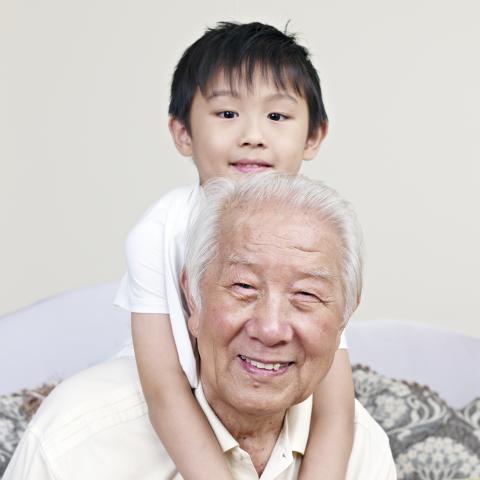Whether it’s a Christmas celebration, a birthday party, or a simple barbecue (churrasco!), there’s a family gathering just about every month in Brazil. Yes, those events where small cousins are running around, grandmother asks about your love life, and there’s more food than people can handle.
Learning how to talk about family in Portuguese is essential, even if you don’t attend one of these family gatherings in Brazil (which we recommend you do!). After all, this is a topic that always comes up in conversations. People will ask you about your family, or tell you stories about their own family involving multiple relatives.
In this article, we’ll go over the vocabulary you need to know to talk about all kinds of families, as well as family-related words in Portuguese. We’ll also see some examples of sentences and questions related to family in Portuguese. But first, let’s go over family values in Portuguese-speaking Brazil and more information on family structures. Ready?
Table of Contents
- An Introduction to Brazilian Families
- The Basics of the Nuclear Family
- The Relatives You See at Christmas
- The New Family: Couples
- Extending the New Family: In-laws
- Blended Families
- Showing Affection: Endearment Terms
- Learn More Portuguese with PortuguesePod101
1. An Introduction to Brazilian Families
Brazilians tend to have very tight-knit relationships with their families. Family definitely continues to be a strong institution in Brazil, and that’s why it’s always one of the first topics in a conversation. Overall, Brazilians are collectivistic, and it’s not uncommon to see several generations living in the same household or very close by.
Of course, we can’t forget that the local culture also lends a lot of importance to celebrations where the whole family comes together to enjoy each other’s company, great food, and music.
Although the family size in Brazil has diminished over the past several years, it’s still common to see numerous families with plenty of children, cousins, uncles, and aunts. This is especially true in smaller cities and rural areas; families in cosmopolitan regions tend to have fewer children.
Unlike in some other cultures, there aren’t different ways to refer to family members in Portuguese based on their age. What does happen a lot in Brazil is the use of a diminutive suffix at the end of words to indicate affection. You’ll see some examples further along. In addition to that, there are other endearment terms and nicknames that Brazilians use to refer to family members with extra fondness.
Another thing to keep in mind is that Portuguese is a language that tends to use the masculine form when dealing with plurals. This characteristic relates directly to Brazilian society, which is largely patriarchal. We’ll discuss the plurals a bit later in this article as well!
Three generations: avô (“grandfather”), pai (“father”), and filho (“son”).
2. The Basics of the Nuclear Family
Let’s start with the basic vocabulary for talking about your immediate family in Portuguese. It might look like a lot of new words, but we’ll put it all in context with some example sentences!
We’ll start by answering the most important question: How do you say “family” in Portuguese?
| Família | “Family” |
| Parentes | “Relatives” |
| Mãe | “Mother” |
| Pai | “Father” |
| Pais | “Parents” |
| Irmã | “Sister” |
| Irmão | “Brother” |
| Irmãos | “Siblings” |
| Filho | “Son” |
| Filha | “Daughter” |
| Filhos | “Children” |
As you can see in the vocabulary table above, when we’re talking about the plural for parents, children, or siblings, we use the masculine form:
- Pai (“father” ) → Pais (“parents” )
- Irmão (“brother” ) → Irmãos (“brothers” or “siblings” )
- Filho (“son” )→ Filhos (“sons” or “children” )
However, if you already know that the siblings or children are all female, then you can use the feminine plural irmãs (“sisters”). If you don’t know, or if there are both male and female siblings, then use the masculine form irmãos (“brothers”). In fact, this plural rule applies to all plurals in Portuguese, so keep that in mind going forward!
Now that you already know the family terms in Portuguese for talking about siblings or children, how can you add more details? Take a look at the words and expressions below.
| Mais novo / nova | “Younger” |
| O mais novo/a mais nova, caçula | “The youngest” |
| Mais velho / velha | “Eldest” |
| O mais velho / a mais velha | “The eldest” |
| Do meio | “Middle” (child or sibling) |
| Filho único / filha única | “Single child” (male) / (female) |
| Gêmeos / gêmeas | “Twins” |
Great, you’ve just learned a bunch of new vocabulary! You might be wondering how these new words look in a real-life sentence. We’ve got you covered:
- Meu filho mais novo (“My youngest son” )
- Ele é o caçula. (“He is the youngest.” )
- Eu sou a irmã do meio. (“I am the middle daughter.” )
- Ela é a filha mais velha. (“She is the oldest daughter.” )
- Tenho dois irmãos mais velhos. (“I have two older siblings/brothers.” )
- Eu vivo com meus pais. (“I live with my parents.” )
- Ele não tem filhos. (“He doesn’t have children.” )
- Os almoços de família são sempre cheios de parentes. (“The family lunches are always full of relatives.” )
When talking to a Portuguese speaker, the conversation about family could go a bit like this:
A: Como está a sua família? (“How’s your family?” )
B: Estão todos bem. E sua mãe? (“Everyone is doing well. How about your mother?l” )
A: Ela está melhor, obrigado. Você tem irmãos, não é? (“She is better, thank you. You have siblings, right?” )
B: Tenho sim! Um irmão mais novo e uma irmã mais velha. (“I do! A younger brother and an older sister.” )
A: Legal! Eu sou filho único. Meus pais nunca quiseram mais filhos. (“Cool! I am an only child. My parents never wanted more children.” )
3. The Relatives You See at Christmas
As we explained before, Brazilians tend to be very close to their relatives, and family gatherings or reunions are a big affair.
| Avó | “Grandmother” |
| Avô | “Grandfather” |
| Avós | “Grandparents” |
| Bisavó | “Great-grandmother” |
| Bisavô | “Great-grandfather” |
| Bisavós | “Great-grandparents” |
| Neto | “Grandson” |
| Neta | “Granddaughter” |
| Netos/Netas | “Grandchildren” |
| Tio | “Uncle” |
| Tia | “Aunt” |
| Tios | “Uncles” or plural form of “uncles + aunts” |
| Tias | “Aunts” |
Note that the first plurals in the table above sound “feminine,” even though the plural favors males as explained previously. This is only a matter of making the word sound more pleasant.
/! Tio (“uncle” ) and tia (“aunt” ) are also used to informally refer to friends’ parents or other adults.
| Primo | “Cousin” (male) |
| Prima | “Cousin” (female) |
| Primos | “Cousins” |
| Sobrinho | “Nephew” |
| Sobrinha | “Niece” |
| Sobrinhos | “Nephews” or plural form of “nephews + nieces” |
| Sobrinhas | “Nieces” |
| Madrinha | “Godmother”v |
| Padrinho | “Godfather” |
| Padrinhos | “Godparents” |
| Afilhado | “Godson” |
| Afilhada | “Goddaughter” |
Check out some examples of dialogues including questions and answers using the new vocabulary.
A: Você tem padrinhos? (“Do you have godparents?” )
B: Sim! Minha madrinha é uma amiga da minha avó. Meu padrinho é meu tio, irmão mais velho do meu pai. (“Yes! My godmother is one of my grandmother’s friends. My godfather is my uncle, my father’s oldest brother.” )
A: Legal! Quantos tios você tem, só um? (“Cool! How many uncles do you have, only one?” )
B: Por parte de pai, só um. Por parte de mãe, tenho um tio e dua tias. (“From my father’s side, only one. From my mother’s side, I have one uncle and two aunts.” )
Another example dialogue:
A: Como foi a festa de aniversário do seu sobrinho? (“How was your nephew’s birthday party?” )
B: Foi muito boa! Todos meus primos estavam lá, então deu pra ver todo mundo! (“It was very good! All of my cousins were there, so I could see everyone!” )
A: E seus avós, eles foram? (“How about your grandparents, did they go?” )
B: Minha avó, sim. Mas meu avô ficou em casa cuidando da minha bisavó. (“My grandmother did. But my grandfather stayed home taking care of my great-grandmother.” )
A: Ah, entendi. (“Oh, I see.” )
B: Mas minha avó ficou feliz de ver todos os netos e netas. (“But my grandmother was happy to see all of her grandchildren.” )
Avó e netos (“Grandmother and grandchildren” )
→ Listen to the pronunciation for the must-know family terms on PortuguesePod101!
4. The New Family: Couples
Beyond the immediate family ties, you also have to learn how to talk about the new family members a married person acquires!
With the new words you’ll see below, you’ll be able to talk about love and passionate relationships. This way, if you need to DTR (define the relationship) in Portuguese, you’ll have nothing to fear!
Here’s how to talk about newly acquired members of the family in Portuguese, and how to define certain relationships.
| Casal | “Couple” |
| Esposo / Marido | “Husband” |
| Esposa / Mulher | “Wife” |
| Casados | “Married” |
| Noivo | “Fiancé” / “Groom” |
| Noiva | “Fiancée” / “Bride” |
| Noivos | “Engaged couple” |
| Namorado | “Boyfriend” |
| Namorada | “Girlfriend” |
| Namorados | “Dating couple” |
| Parceiro | “Partner” (male) |
| Parceira | “Partner” (female) |
| Ex | “Ex” |
| Divorciado | “Divorced” (male) |
| Divorciada | “Divorced” (female) |
| Amante | “Lover” |
| Amantes | “Lovers” |
| Viúvo | “Widower” |
| Viúva | “Widow” |
Here’s a dialogue example filled with real-life phrases you might hear in Portuguese:
A: Finalmente vou conhecer a sua namorada? (“Will I finally meet your girlfriend?” )
B: Namorada, não. Mas a minha noiva sim! (“Girlfriend, no. But my fiancée, yes!” )
A: Não acredito! (“I don’t believe it!” )
B: Acredite! Tenho uma foto dela, olha. (“Believe it! I have a picture of her, look.” )
A: Ah, muito mais bonita do que sua ex-esposa. Fazem um casal lindo! (“Oh, she is much prettier than your ex-wife. You make a beautiful couple!” )
O casal chegou! (“The couple arrived!” )
→ If love is in the air, you might want to learn these love phrases with PortuguesePod101!
5. Extending the New Family: In-laws
Once the family expands, you’ll have to get used to many more family members! Nothing to worry about, though. In real life, the in-laws tend to be less scary than in the movies.
In Portuguese, it’s not as easy as simply adding “-in-law” to already familiar words. So take your time to practice and understand these different words for the extended family in Portuguese!
| Sogro | “Father-in-law” |
| Sogra | “Mother-in-law” |
| Sogros | “Parents-in-law” or plural for “father-in-law + mother-in-law” |
| Genro | “Son-in-law” |
| Nora | “Daughter-in-law” |
| Cunhado | “Brother-in-law” |
| Cunhada | “Sister-in-law” |
For example:
- Manda um beijo para a sua sogra. (“Send a kiss to your mother-in-law.” )
- Quantos cunhados você tem? (“How many brothers-in-law do you have?” )
- Meu genro é muito inteligente. (“My son-in-law is very smart.” )
5. Blended Families
Like in many other countries, the family structure is changing rapidly in Brazil. The term “blended family” refers to cases where one or both of the spouses have children from other relationships. That means more family relations and more words to discover!
Here’s a list of words you can use to describe these family ties in Portuguese:
| Padrasto | “Stepfather” |
| Madrasta | “Stepmother” |
| Enteado | “Stepson” |
| Enteada | “Stepdaughter” |
| Enteados | “Stepchildren” |
| Meia-irmã | “Half-sister” |
| Meio-irmão | “Half-brother” |
| Meio-irmãos | “Half-siblings” |
| Irmã do outro casamento | “Stepsister,” literally translating to “sister from another marriage” |
| Irmão do outro casamento | “Stepbrother,” literally translating to “brother from another marriage” |
| Irmãos do outro casamento | “Step-siblings” |
As you can see, the terms for step-siblings are a mouthful. As a result, they’re not used very often, and it’s common to just use the words irmão (“brother”), irmã (“sister”), or irmãos (“siblings” ) to refer to step-siblings.
Here are some examples:
- Eu gosto da minha madrasta. (“I like my stepmother.” )
- Nossos meio-irmãos são mais novos. (“Our half-siblings are younger.” )
- A sua enteada tem quantos anos? (“How old is your stepdaughter?” )
A família foi para a praia (“The family went to the beach” )
6. Showing Affection: Endearment Terms
As we said before, family relations are very important and central to Brazilian culture. Therefore, it’s not surprising that there are plenty of endearment terms used to refer to some of the family members we covered in this article.
Why don’t we play a game, then? Take a look at the words below and try to guess what family member each term refers to. After you’re done, scroll down to get the answers!
| Mamãe |
| Papai |
| Vovó |
| Vovô |
| Dinda |
| Dindo |
| Bisa |
| Biso |
| Titio |
| Titia |
Hey, no cheating!
But if you’re done, here’s the translation for each word:
| Mamãe | “Mommy” |
| Papai | “Dad” |
| Vovó | “Grandma” |
| Vovô | “Grandpa” |
| Dinda | Endearment term for “godmother” |
| Dindo | Endearment term for “godfather” |
| Bisa | Endearment term for “great-grandmother” |
| Biso | Endearment term for “great-grandfather” |
| Titio | Endearment term for “uncle” |
| Titia | “Auntie,” endearment term for “aunt” |
In addition to the terms listed above, it’s very common to use the diminutive ending to convey affection. For the cases we’re discussing in this article, the endings are:
- -inho for masculine words
- -inha for feminine words
And here are some examples of endearment terms with the diminutive ending.
- Mãe (“mother” ) → Mãezinha
- Pai (“father” ) → Paizinho
- Avó (“grandmother” ) → Vózinha
- Avô (“grandfather” ) → Vôzinho
- Vovó (“grandma” ) → Vovózinha
- Vovô (“grandpa” ) → Vovôzinho
- Prima (“cousin” female ) → Priminha
- Primo (“cousin” male ) → Priminho
- Tia (“aunt” ) → Tiazinha
- Tio (“uncle” ) → Tiozinho
- Neta (“granddaughter” ) → Netinha
- Neto (“grandson” ) → Netinho
In some places in the north and/or the northeast of Brazil, you can also hear the following endearment terms:
- Mainha (“mom”; exclusive to the Northeast)
- Painho (“dad”; exclusive to the Northeast)
- Mana / Maninha (“sis” / “sister” )
- Mano / Maninho (“bro” / “brother” )
- Maninha (“little sister” )
- Maninho (“little brother” )
/! While in the north and northeast of Brazil, mano and mana are used to refer to blood relations, those words can also be used as slang throughout Brazil. Context will be your best friend when you encounter those words!
Avôzinho e netinho (“Grandfather and his little grandson” )
7. Learn More Portuguese with PortuguesePod101
We hope this complete guide to talking about family in Portuguese was helpful to you! Now you’re ready to engage in conversation about family members and tell old family tales like a native Portuguese speaker. If you want to take it a step further, practice the pronunciation of the terms and words you learned today.
Were the examples we presented useful? Did we miss any important words you wanted to learn? Let us know in the comments! And remember that you can come back to this article whenever you need to and refresh your memory.
Now it’s time to continue on your language-learning journey! There are more free Portuguese resources and a variety of vocabulary lists available on PortuguesePod101.com. Go ahead and choose your favorite tools to expand your learning opportunities.
If you want to take your learning experience further, members of PortuguesePod101.com get access to the largest language lesson library in the world, with thousands of real lessons by real teachers. Perfect for anyone who wants to learn from anywhere, feel motivated, and be ready to speak Portuguese with confidence. And in the meantime, continue exploring PortuguesePod101!


















